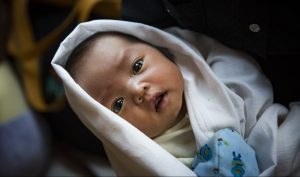Birth Registration
“Count every child because every child counts!” is a slogan that conveys UNICEF’s dedication to child rights through mandating birth registration.
Birth registration is a fundamental human right because it provides legal proof of identity, prevents child abuse (such as marriage before the age of majority), and provides the government with data for budgeting and planning purposes. It is a stepping stone to more official identification, like passports, driving licenses, and national ID cards. Voting, creating a bank account, obtaining official employment, registering property, and obtaining a mobile phone are just some of the numerous activities that need these documents.
Despite recent advances, Pakistan has meager birth registration rates; the Pakistan Demographic and Health Survey (PDHS) 2017-18 reported that just 42% of children under five had their births recorded. UNICEF reports that birth registration rates are low. In Pakistan, 9% of the world’s 166 million children, under the age of five, are unregistered.
Governments are responsible for ensuring that all citizens record their births in the civil registration and vital statistics system (CRVS), as well as other important life events, including: marriage, divorce, adoption, and death. Article 7 of the 1989 Convention on the Rights of the Child, which Pakistan has accepted, stipulates that every child has the right to be registered at birth and acquire a nationality. Similarly, Pakistan’s National Child Policy acknowledges that “every child has the right to life, liberty, a name, and to acquire a nationality.”
The most vulnerable members of society, such as those living in poverty, and minorities, have been neglected in Pakistan. There are significant differences in birth registration across provinces, between rural and urban areas, and between the wealthy and the rest of the population. According to the 2009 Charter of Child Rights Act: Article 5(1), Provincial Governments shall ensure that every child is registered immediately after birth, has the right to a name at birth, the right to acquire a nationality, and, as far as possible, the right to know and be cared for by his parents.
CREDP maintains that birth registration is irrefutable proof of a child’s existence, and the right to be treated as a person in the eyes of the law. Lack of awareness and prioritizing is the most prominent cause of widespread obstacles related to birth registration. Most of Pakistan’s population (62.5%) resides in rural and remote locations, where many parents must be made aware of the need to register their children with NADRA. It is safe to infer that the education level of citizens correlates with their awareness of birth registration. Hence, low levels of education or a lack thereof, make the problem persist. Government authorities should consider implementing a robust strategy to make birth registration mandatory for everyone in the country. The government must take the lead in spreading awareness and educating the public in this regard.
LATEST
UPDATES

Empowering Pakistan’s Future: The Importance of Girls’ Education
Despite some progress, Pakistan still faces significant challenges in ensuring equal access to quality education for girls.
LATEST PUBLICATIONS

Empowering Pakistan’s Future: The Importance of Girls’ Education
Despite some progress, Pakistan still faces significant challenges in ensuring equal access to quality education for girls.
LATEST PUBLICATIONS

Importance of Birth Registration
Birth registration is the official recording of a child’s birth by the government or relevant authorities.

